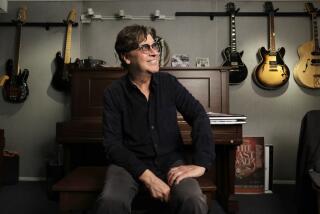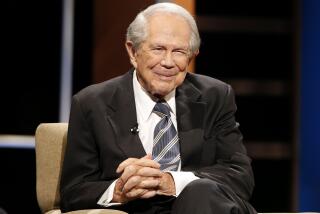Pat Robertson and the Scottish Enlightenment, Part II
- Share via
BRUSSELS — The fundamentalist Christian evangelist and businessman Pat Robertson should have known we Scots are a fractious and argumentative folk. He is, after all, one of us, claiming descent from a Rev. James Robertson, who emigrated to Virginia in 1695. So when the spiritual father of the Christian Coalition paid a call at the headquarters of the Bank of Scotland (BoS) in Edinburgh last summer, it must have felt like going home.
But Scotland these days is an unpredictable place, just starting to enjoy the fruits and challenges of home rule after nearly 300 years of government from London. Under the devolution policies of Britain’s Prime Minister Tony Blair, Scotland has its own elected parliament (with only modest tax-raising powers so far) to go with the distinct legal, education and banking systems it has always enjoyed.
Not only is Scotland changing, its identity swings uneasily between extremes. There is the Scotland that Robertson doubtless finds congenial, of kilts and tartans, of grand hotels in ancient castles alongside golf courses where bars stocked with a range of incomparable malt scotch whiskeys await at the 19th hole.
There is also the Scotland that houses some of the worst heroin and crack-cocaine ghettos in Europe, which helps sustain the routine violence of Glasgow streets when the pubs close. Successive Socialist city governments built gulag-style public-housing projects that look like something Josef Stalin designed.
Robertson went to Edinburgh to make a business deal with the Scotland he thought he knew, only to find that the modern Scotland possessed far different, far more progressive attitudes.
Think of it as the difference between “Braveheart” and “Trainspotting,” between Hollywood’s image of the Scots and the home-grown film. “Braveheart” gave us a comforting myth of bold and clever Highlanders fighting heroically for their freedom against the cold English oppressor. It had an electrifying political effect in a Scotland poised for the chance of running its own affairs.
People went to see it three and four times and gave standing ovations when the film ended. Scottish sports fans started painting their faces blue, just like the troops in “Braveheart,” apparently unaware that Julius Caesar fought his way ashore on the southern coast of England in 54 BC against local tribesmen bedaubed with blue woad.
“Trainspotting” was rather different, a nightmarish slice of modern Scottish urban life, of youth unemployed and the drugs they took. A megahit in Britain, it has become a cult classic in the U.S., with the compelling image of a junkie scrabbling in a foul toilet bowl for his fix. That is as much a part of today’s Scotland as the high-tech corridor known as Silicon Glen, or the booming service base of the oil industry that makes the Aberdeen region the richest in Britain, after inner London, or the plush Edinburgh reception rooms of Scottish merchant banks.
One such bank, Ivory and Sime, has enjoyed a profitable U.S. connection since it sent a young executive, James Gammell, scouting for business after World War II. In Houston, he was introduced to an ambitious young Yale graduate just starting out in the Texas oil fields in the early 1950s. Gammell put $50,000 into the company being founded by future President George Bush and made his bank a great deal of money and some very useful friendships.
Gammell went on to become a director of the Bank of Scotland (his son remains a close friend of the young George W. Bush now running in his father’s footsteps for the presidency) and to build the business through the GOP circles to which the Bush connection opened the door. This was the route that Robertson took to Edinburgh last summer to seek investors from the BoS.
But the founder of the Christian Broadcasting Network quickly realized there was far more tempting business on offer. The BoS had been swift to capitalize on electronic banking and the Internet, and linking this to “affinity groups” like British labor unions and loyal customers of big British retail chains, offered special deals in return for their custom.
Robertson saw the opportunity. The BoS had the technology and skills and wanted to enter the U.S. banking network. He had the potential customer base of 2 million Christian Coalition members and the 20 million who regularly watch his channel. It looked like a marriage made in heaven.
In February, the BoS and Robertson Financial Services, a company owned by Robertson, applied for a national charter for their U.S. bank, under the name “The New Foundation.” The BoS would hold the majority shares, and Robertson would own 24.9% and be chairman.
Both Scotlands exploded in outrage, the old establishment and the raw and modern young country with its gays, activists and minority groups. On March 12, gay activists and students led a protest at the BoS main branch. Then the chaplain of Edinburgh University said he was “embarrassed and disgusted” that people could associate the fundamentalist Robertson with Christianity.
As accounts spread through the Scottish media of Robertson’s views on the Bible and homosexuals and Jews and the perils of world government as plotted by the liberal media, public outcry deepened. The municipal government of West Lothian threatened to withdraw its account from the BoS, and since its turnover was well above $1 billion a year, this got attention.
Robertson was understandably shaken by the opposition. On his regular “700 Club” show last month, he informed his TV audience that Scotland was “a dark place overrun by homosexuals.”
By this time, Scottish gay groups were in constant touch with U.S. colleagues, exchanging information on Robertson’s intolerant view of their sexuality. The Scottish media, with its national TV and radio stations and an array of legendarily hard-competing newspapers, took Robertson into its collective jaw and chewed.
The Scotsman, an aged and dignified newspaper, took Robertson apart on its editorial pages, quoting from his books and broadcasts and concluding: “For a man who made his fortune in broadcasting, Robertson seems to have a difficult time grasping the idea that words have meaning. In Scotland, he has found that to his cost.”
The furor was more than a public-relations disaster; it threatened to become a run on the bank. The Manufacturing, Science and Finance Union pulled out of a lucrative credit-card deal with the bank involving its 420,000 members. The Trades Union Congress warned that another 100,000 members of labor unions held affinity credit cards with the BoS, which could now be discarded.
The BoS gave in, apologized to its customers for making a mistake, pulled out of the deal and paid Robertson a tidy $3 million in compensation. Just to rub home the message, Britain’s Laura Ashley retail chain accepted Robertson’s resignation from its board of directors last week.
For a small northern country of just under 6 million people, the “dark place overrun by homosexuals” has handed Robertson the biggest rebuff of his life. What the massed ranks of the American gay and Jewish lobbies and the liberal media had been unable to achieve, Scotland accomplished in a brief, tumultuous surge of collective outrage.
Robertson should not be surprised. We heirs of the 18th-century Edinburgh enlightenment learned from Adam Smith a bit about business and learned to think about ethics and reasoned discourse from his great contemporary, David Hume. We did not think the Virginia fundamentalist was worthy to join this tradition.
Moreover, we like a good row. We Scots have squabbled for years, preferably against the English or among ourselves in clan feuds whenever the English gave up the unequal struggle. Proud Highlanders tended to look down on the money-grubbing Lowlanders, and we Islanders (this is written by the son of a McNeil of the Hebridean island of Barra) look down on them all.
Each evening, as my clan chieftain (currently an American law professor) sits to eat, the clan piper walks to the ramparts of the 11th-century Kisimul castle and proclaims: “The McNeil of McNeil has dined--the rest of the world may eat.” As far as most of his fellow Scots are concerned, Robertson can jolly well starve, until he learns to keep a civil tongue in his head when he talks of Scotland, new or old.*
More to Read
Sign up for Essential California
The most important California stories and recommendations in your inbox every morning.
You may occasionally receive promotional content from the Los Angeles Times.










